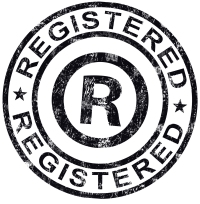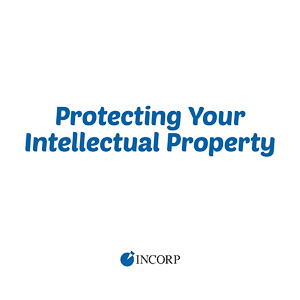Protecting Copyrights and Trademarks
One of your company's most valuable assets could be at risk, and if you're like many small business owners, you may not even know it. That asset is your company's "intellectual property," which includes your name, logo, printed materials, videos, and anything else that can be considered a creative work. These can be protected by either copyrights or trademarks to prevent other companies from using them.
Intellectual property also includes inventions and discoveries, which we'll cover in Part II of this series.
Have you ever wondered about the difference between the various symbols: ©, ™, ℠ and ®? They all indicate that the referenced words or symbols are legally protected. A copyright, denoted by the © symbol, protects original works of authorship, such as books, movies, architectural drawings, brochures, and the content on web pages (including this one). A trademark (™) is a word, phrase, symbol, or design that distinguishes goods from those manufactured or sold by others and indicates the source of the goods. (Think Coke, the McDonald's arches, or the Nike swoosh). A service mark (℠) is essentially the same as a trademark, but it is used for services rather than products.
It's important to realize that you have legal rights over your intellectual property as soon as it's created, whether you register it or not. If you design a logo for your company, Joe's Dill Pickles, you can immediately use the ™ symbol (Joe's Dill Pickles™) and create a brochure describing your company, with "© 2019, Joe's Dill Pickles. All Rights Reserved." at the bottom. This gives notice to other businesses that you're claiming the rights to the works you've created (the logo and the brochure). You don't have to register your copyrighted material or your trademark, but depending on your situation, it might be a good idea.
-
Copyrights – Do You Need One?
A copyright literally means the right to copy. The owner of a copyright has the exclusive right to reproduce, distribute, or perform the work (depending on what it is) and to license other people to do so. The creator of the work (the author) automatically has a copyright as soon as the work is completed. If your business hires someone to create a brochure, web page, instructional video, etc., your company — not the person creating it — owns the legal copyright.
Most small businesses won't need to register their copyrighted materials, but there are important exceptions. For example, a software company, a business that creates videos, or a magazine publisher would want to make sure they are legally protected against copycats, while Joe's Dill Pickles probably won't worry about someone copying his brochure or website.
Registering a copyright is relatively simple. It can be done online through the U.S. Copyright Office and usually costs less than $100. You just need to send in an application form along with a copy of the work you want to register, and the Copyright Office records it. Registering your copyright lets you immediately enforce your rights against copycats, and also makes it easier to seek attorney fees and statutory damages if you take them to court.
-
Registering Your Trademark
What about the ® symbol? Called the registered trademark, it proves that the United States Patent and Trademark Office (USPTO) has officially accepted your trademark for registration. A small business owner may not be too concerned about registering a trademark if they just sell locally (for example, a produce market or a car repair shop). It's unlikely that someone else in town would want to steal their name or copy their logo, and if they did, it would be relatively easy to make them stop. But with the advent of e-commerce, trademark protection is becoming more important than ever before. Someone on the other side of the country, or the other side of the world, may be able to cause you expensive legal problems.
Not every trademark can be registered, so if you're just starting a business, it's important to choose a trademark that can pass the USPTO's stringent requirements. Check out guidelines at www.uspto.gov before choosing a trademark. The most common reason for denying an application is that some other business has already applied for or received registration for a similar trademark. That's one reason so many new companies are choosing what the USPTO calls "fanciful" marks: Invented words with no dictionary meaning (e.g. Google and Bing) or "arbitrary" marks that have a dictionary meaning not associated with their product (e.g. Fandango and Twitter).
Once you've decided on a trademark for your new business (or if you already have an established business name), you can check online at the free Trademark Electronic Search System (TESS) to see if anyone else has already applied for or registered the mark you want. If not, you can fill out an application using the Trademark Electronic Application System (TEAS). It typically costs between $275 and $325 to register each mark with the USPTO. Once your application has been approved, you can use the coveted ® mark after your logo or product name to show it's been officially registered.
-
Two Important Caveats
Before you send your hard-earned application fee to the feds, you need to know that searching on TESS does not ensure that no one else has prior claims to your trademark. Remember, parties are not required to register their marks in order to have trademark rights. Searches conducted on TESS are limited to the database of federal trademark applications; they don't include data on businesses that may already be using your mark without registering it. It may be worth the extra cost to hire an attorney who specializes in trademarks, so he or she can conduct a comprehensive trademark search, including state registrations, business license filings, etc.
The second caveat is that the USPTO is not an enforcement agency. After your trademark is registered, it's up to you to monitor the Internet to make sure no one else is using your mark, and it's also up to you to convince copycats to stop their illegal activity. This may involve hiring an attorney to issue a cease-and-desist order.
Considering the importance of this issue, it may be wise to talk with an attorney about the best way for your business to protect your valuable intellectual property assets.
Resources:
- United States Patent and Trademark Office
- United States Copyright Office
- Copyright Basics booklet
- USPTO booklet: Protecting Your Trademark: Enhancing Your Rights through Federal Registration
- TESS Trademark search system
- Trademark Electronic Application System
Related Articles and Services:
- What is a Copyright?
- Trademark Monitoring
- Protecting Copyrights and Trademarks
- Patent Trolls
- Order Copyright Service
- Order Trademark Service
Stay in the know!
Join our newsletter for special offers.



